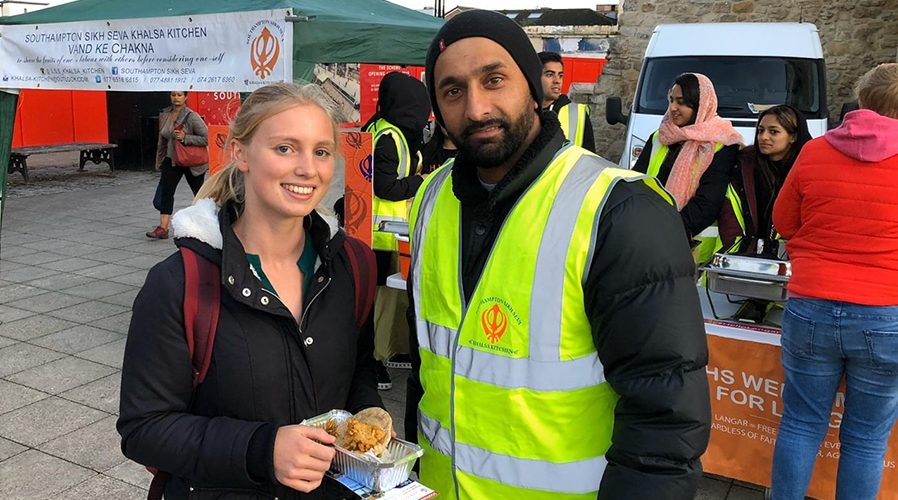The charity dedicated to feeding the city’s homeless
Have you ever heard of the 500-year-old Sikh practice of Langar?
Don’t worry if you haven’t – it was a new one for me too.
You might also be wondering what this religious tradition has got to do with modern day Southampton. Well, as this week was National Langar Week, it seemed to be the perfect opportunity for me to find out more.
Every evening from the 7th to the 13th of October, the Southampton Sikh Seva charity took to the streets to raise awareness of the Sikh practice of Langar. They served warm, traditional food in different locations across the city to anyone who wished to try it.
I went along to have a chat to the wonderfully friendly volunteers and to sample the incredible food.
If you want to learn more about this heart-warming traditional practice and find out what this organisation are doing to help the homeless population of Southampton, then read on.
Sikhism
If I’m honest, I knew very little about the Sikh religion before this week. All I had were some vague half-remembered facts from religious education classes at school. To avoid revealing my ignorance, I thought I’d better read up on the religion before going to talk to the society.
Sikhism is a relatively new religion, being just 500 years old, and has around 30 million followers. It originated from Punjab, an area which spans parts of India and Pakistan. Sikhism is a monotheistic religion, meaning that they believe that there is one god. The Sikhs’ place of worship is called a Gudwara, which means ‘Gateway to Guru’.
Since moving to Southampton, I’d noticed that there seemed to be a large community of Sikhs living in the city. Sikhs actually make up just 1.3% of the population of Southampton.
However, 32% of these Sikhs live in Bevois Ward, where they make up 9% of the ward’s population. This happens to be the area I walk through to get to work, which means that every day, I see two of the four Gudwaras in Southampton along Bevois Valley Road.
What is Langar?
Langar means ‘free kitchen’ and refers to the free meal which is served in Gudwaras. The practice was introduced by the first guru (teacher), Guru Nanak Dev Ji. The food is served to all visitors, regardless of their religion, race, age, gender or social status.
Traditionally, people eat Langar sitting on the floor all together, to reinforce this idea of equality and the breaking down of social barriers. The food is prepared and served by volunteers, and everyone is encouraged to help out. The food is always vegetarian so that people of all faiths can eat it.
Langar Week
Langar Week is an annual campaign headed by the Sikh Press Association. The aim of the campaign is to highlight the practice of Langar and share the three main principles of the tradition: equality, fighting hunger, and teaching compassion. According to the association’s website, there are events running across the UK, as well as in North America and India.
Langar Week in Southampton is now in its fifth year. It started as just a one-off event but was so successful it has become an annual event.
A colleague and I went along after work to check it out. The volunteers had made a base for the evening by the Bargate in the centre of Southampton.
Friendly volunteers and delicious food
It was a cold, damp evening, so the volunteers were dressed in layers of warm clothes and waterproofs. The weather didn’t seem to dampen their enthusiasm, though, and as my colleague and I approached the stall, we were met with the friendly, smiling faces of the organisers and the volunteers from the University of Southampton. They happily answered all of our questions, but not before handing us a delicious plate of food.
The food was a simple vegetarian curry with a side of rice. On top of that was traditional Indian bread and a bhaji*. The dishes were warm and comforting, especially in such miserable weather. It was a little bit spicy, although according to a smiling helper at the stand, they tone down the levels of spice to accommodate the locals’ taste buds. There were also some drinks and a healthy dessert of a fruit salad.
Helping the homeless
Whilst we ate our food, we had a long chat with one of the organisers. I was curious about the work the organisation did with the homeless.
Throughout the year, the charity prepares and serves food specifically for homeless and vulnerable people in the city. The charity was established at Christmas time around five years ago, when a group of individuals decided that they wanted to do something to help people less fortunate than themselves. They go out once a week, delivering the food throughout the city. The association estimates that they feed around 50 people every week.
The volunteer I talked to seemed frustrated by the lack of support for homeless people in Southampton, as well as the rise in the number of people who’ve hit hard times. He showed a well-deserved pride in the work his charity does. He talked of the difficulty he has with juggling a family, his work and the organisation, but says that without a doubt it’s worth the effort.
Conclusion
It was a privilege to learn more about the traditional Sikh practice of Langar and about the fantastic work of Southampton Sikh Seva. The charity welcomed us with open arms and answered all of my questions in great detail. They also made sure to say that anyone and everyone is welcome to help out.
If you wish to volunteer your time or simply want to learn more about the Sikh religion, then make sure to get in touch with the charity.
Khalsa-kitchen@outlook.com
Instagram: @southamptonsikhseva
Facebook: Southampton Sikh Seva
*bhaji – a bhaji is a crispy, crunchy batter-fried snack made of vegetables. It is popular in Indian, Pakistani and Afghan cuisine.











Leave a Reply